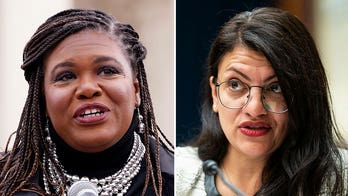Supreme Court to decide if Electoral College voters must vote for winner of state
The Supreme Court plans to hear a case on if presidential electors have to vote in accordance with their state's popular vote in the Electoral College.
The Supreme Court sought Wednesday to resolve a time-sensitive dispute over a unique aspect of American democracy -- the Electoral College -- with several justices expressing skepticism at the unfettered discretion of a select group of individuals to ignore the will of voters.
At issue is whether so-called "faithless electors" are bound to support the popular winner in their state's presidential race. About 30 states and the District of Columbia require it.
The first case heard by the Supreme Court Wednesday, Chiafalo v. State of Washington, came about after three Washington state electors in 2016 voted for Colin Powell for president rather than Democratic nominee Hillary Clinton, who received the most popular votes.
Lower courts have issued conflicting rulings, leaving it for the justices to try and sort out the tricky practical and political implications.
Early in the arguments, some justices pushed back at the idea states were essentially powerless to sanction faithless electors.
"What authority does the state have here?" asked Justice Clarence Thomas regarding the removal of electors. "Can the state openly remove someone who solicits money for his vote?"
Justice Samuel Alito suggested that a few faithless electors in key states in a close election would create “chaos” and “uncertainty.”
Justice Stephen Breyer questioned how a faithless elector law is any different from laws requiring that electors be permanent residents of the state they represent.
Lawrence Lessig, attorney for the electors, claimed the difference is that it is permissible to remove an elector prior to the vote, but it is improper to control the vote itself. He warned that allowing a state to control how electors vote would result in potentially "an endless list of partisan opportunism."
Lessig suggested that if states can control votes, they could theoretically forbid electors from voting for candidates who have never visited their state or who have not released their tax returns.
Washington Solicitor General Noah Purcell insisted that a state's constitutional power to appoint electors includes the power to remove them.
He also argued that state electors have always been appointed based on whom they support, not for their own merit, and that it "doesn't make sense" to think the framers of the Twelfth Amendment intended for electors to exercise their own discretion.
GORSUCH'S PIVOTAL VOTE COULD FAVOR OKLAHOMA TRIBE IN CONTROVERSIAL NATIVE AMERICAN RAPE CASE
Justice Sonia Sotomayor questioned Purcell's reasoning.
"Isn’t the idea that the power to appoint includes the power to remove highly contextual?" she asked, stating that he was "assuming the conclusion."
Sotomayor recused herself from the second case of the day, Colorado Department of State v. Baca, because she knows an elector involved in the case.
That case came about after Colorado elector Michael Baca chose former Ohio Governor John Kasich, a Republican, instead of Hillary Clinton in 2016 despite Clinton garnering the most votes in that state. Baca sued after being removed as an elector.
"What is the purpose of having electors?" Justice Brett Kavanaugh asked Colorado Attorney General Philip Weiser.
Weiser said the Electoral College system "allows for states to make a choice." He said that electors can either be proxy voters for a state's popular decision or they can be "free agents," and it is up to states to "choose whatever model they want." Colorado chose the proxy model.
Thomas challenged the idea that states cannot place restrictions on for whom an elector votes, claiming that otherwise an elector could vote for Frodo Baggins, of Lord of the Rings fame. Baca's attorney Jason Harrow pushed back on that, stating that there is already a requirement that a vote go to an actual living person.
CLICK HERE FOR THE FOX NEWS APP
Alito asked if a lack of requirements for electors to vote according to a state's popular vote could lead to "chaotic" consequences. He brought up the possibility of a close election where there could be campaigns to sway individual electors to vote one way or the other.
Harrow countered by stating that this already happens, pointing to the 1876 election, as well as research that he said shows that campaigns of this nature took place as recently as 2016.






